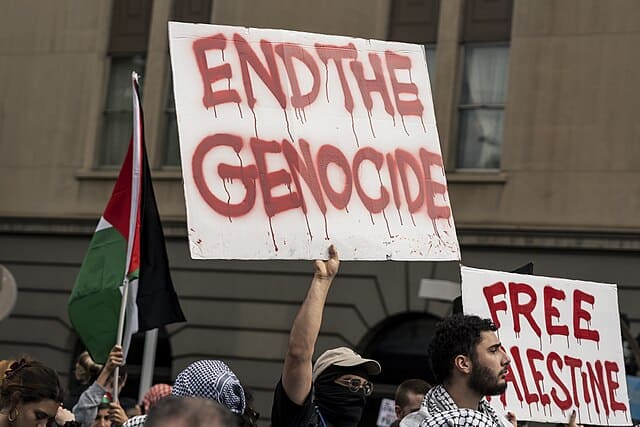For the past month, the Israeli-Palestinian conflict has been making headlines in printed, radio, television and newspapers around the world. It has once again become the priority issue for chancelleries, not only of Middle Eastern countries but also of the great powers.
Yet it is only a very localised conflict, extending over a few hundred square kilometres. The Gaza Strip, territory which Israel took control of during its victorious war in spring 1967 against Egypt, is only 365 square kilometres.
This localised conflict is far from being the only one today. But we talk infinitely less about others. The Nagorno-Karabakh enclave, Armenian since time immemorial, was attacked and taken by Azerbaijan on September 19, after a nine-month blockade.
In almost general indifference, its 120,000 inhabitants fled to neighbouring Armenia. Neither America, nor Europe, nor Russia has lifted a finger to prevent this ethnic cleansing. The conflict which pitted the Tigray province against the central government of Ethiopia, aided by Eritrea, from November 2020 to 2022, left half a million dead. Almost no one talked about it.
Why does the Israeli-Palestinian conflict so captivate crowds and decision-makers around the world, to the point of having eclipsed the Ukrainian war?
This conflict attracts everyone’s attention because it is at the heart of the criticisms made today by the countries of the global South against Western powers. Since the beginning of the 21st century, and especially since the Anglo-Saxon invasion of Iraq in March 2003, these have criticised the latter for pursuing a policy of double standards, while preaching universal human rights.
The global South accuses Westerners of hypocrisy. And the first example it takes is always Israel which, it is true, has treated UN resolutions with a certain casualness since the 1950s, without the West having ever taken the slightest sanction against it. The global South criticises the West for having devoted less energy to the creation of a Palestinian state than they had devoted to the creation of the state of Israel.
This may be false, but it is what is felt by all Muslims on the planet, as well as by many Christians in poor countries in Africa and Latin America. Yet in international relations, it is the feeling of the realities that counts, more than the realities themselves.
The Queen of Jordan echoed this sentiment, declaring that Westerners had more compassion for the Israeli victims than for the Palestinian victims.
To the abominable abuses committed on October 7 by Hamas on the internationally recognised territory of Israel, the IDF overreacted, as desired by the Palestinian Islamist movement. Hamas prioritises its ideology over the happiness of the population it administers.
The images of razed buildings in Gaza and bloodied children in the arms of their Palestinian parents provoked what Hamas wanted: the globalisation of the problem, the transformation of a limited territorial conflict into a war of civilisations.
Tactically, the current Israeli plan is understandable: after taking a line going to the sea and dividing the Gaza Strip in two, the IDF will clean up, building by building, underground by underground, the northern part. They will lose men, but will succeed in this operation. As Massu won the Battle of Algiers in 1957.
But what is Israel’s medium and long term strategy? Once the cleanup is complete, to whom will the Jewish state entrust the administration of this occupied territory? Who will agree to manage this pile of ashes? Certainly not the PLO which, since the Oslo Accords, has administered around 40 percent of the West Bank.
The global impact of this war will be unfavorable, not only to Israel but to the entire West.
Strategically, the Jewish state has returned to the point where it was in 1982, the time of its invasion of Lebanon. Because of the feelings of the populations, which the leaders of the Arab world cannot ignore, the Abraham Accords are suspended, which economically integrated Israel into its regional environment. Also gone is the India-Emirates-Saudi Arabia-Jordan-Israel-Italy economic corridor, which Netanyahu exposed in September at the United Nations.
The conflict is unfortunate for the entire West, because it relativises Russian aggression in Ukraine and introduces seeds of division even within Western societies.
The now global cost of this local conflict demands a global response. It can only be given by a conference bringing together the five permanent members of the Security Council, Israel and all the Arab states having recognised its right to exist.
This blog first appeared in Le Figaro, November 2023.





